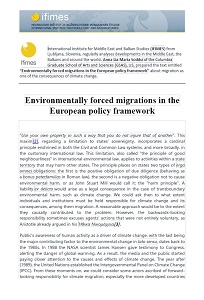Environmentally forced migrations in the European policy framework
Environmentally forced migrations in the European policy framework
Author(s): Anna Lia Maria Soddu
Subject(s): Politics, Environmental interactions, Migration Studies, EU-Approach / EU-Accession / EU-Development, Asylum, Refugees, Migration as Policy-fields
Published by: IFIMES Mednarodni inštitut za bližnjevzhodne in balkanske študije
Keywords: European policy; migration; environment; forced migrations;
Summary/Abstract: “Use your own property in such a way that you do not injure that of another”. This maxim[2], regarding a limitation to states' sovereignty, incorporates a cardinal principle enshrined in both the Civil and Common Law systems, and more broadly, in the customary international law. This limitation, also called “the principle of good neighbourliness” in international environmental law, applies to activities within a state territory that may harm other states. The principle places on states two types of erga omnes obligations: the first is the positive obligation of due diligence (behaving as a bonus paterfamilias in Roman law), the second is a negative obligation not to cause environmental harm, or as John Stuart Mill would call it: the "harm principle". A liability ex delicto would arise as a legal consequence in the case of transboundary environmental harm, such as climate change. We could ask then to what extent individuals and institutions must be held responsible for climate change and its consequences, among them migration. A reasonable approach would be to the extent they causally contributed to the problem. However, the backwards-looking responsibility sometimes excuses agents' actions that were not entirely voluntary, as Aristotle already argued in his Ἠθικὰ Νικομάχεια[3].
Series: IFIMES Research Papers
- Page Count: 6
- Publication Year: 2022
- Language: English
- Content File-PDF

